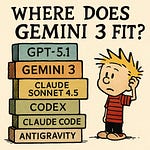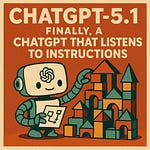I told myself I wouldn't do this again. After my 66-page prompt opus in April, I swore I'd keep things shorter. More digestible. Reader-friendly.
[Narrator voice: He did not keep things shorter because there’s too much good stuff.]
This collection is ~145 pages long. It contains 39 essential prompts in a detailed Google Doc, many with multiple variants, plus 6 pages of context that explains why prompting has fundamentally changed in 2025. And yes, there's a table of contents in that Google Doc so you can actually navigate this beast and find exactly what you need.
Because my longing to suffer, why did I write another novel-length prompt guide? Because something clicked for me recently. I realized my prompts and how I talk about them needed to evolve to keep pace with frontier model capabilities. And with ChatGPT-5 on the horizon (rumored for July), I wanted to bring the prompt stack up to snuff with what today’s models can do.
These aren't random prompts I think might be useful. These are the 39 prompts I have labored over, technically, repeatedly, as many different ways as I can think of to make them excellent.
How?
By checking them vs. actual published prompting guides (I list 18 of them below) to ensure they adhere to best practices (lots of these have been published since April)
By developing multiple variants to give you different options depending on your level of effort
By choosing a range of prompts that cover the full spectrum of decision-making I see actually cropping up in work (and life)
That last is key: I find a lot of my earlier prompt work has been a bit constrained by earlier model intelligence levels. I’ve felt like I needed to constrain to particular job families in the past because earlier models leaned into fairly defined work and task completion assignments. And that has value!
But we can do more cool stuff with the newer models. There’s a chance with these newer models to ask much more ambiguous questions.
Like: When I need to make a decision that will affect the next five years. When I'm staring at feedback that stings and need to figure out what's actually useful in it. When a project is falling apart and I need structured thinking, not panic. When I'm trying to learn something new and don't want to waste months on bad approaches.
I've been living with these frontier models—Claude 4, o3 Pro, Gemini 2.5 Pro—like they're colleagues. Maybe closer than colleagues. We've developed a working relationship where I know exactly how to activate their best thinking, and they know (through my prompts) exactly what kind of thought partnership I need.
Each prompt in this collection does something specific:
Turn vague anxiety into clear action (Future Regret Minimizer, Change Readiness Evaluator)
Extract signal from noise (Dynamic Qualitative Insight Explorer, Strategic Feedback Interpreter)
Force hard choices (Comprehensive Tradeoff Analyzer, Meeting Killer)
Design better systems (Database Schema Designer, Automation Opportunity Scanner)
Navigate complex human dynamics (Stakeholder Navigation Guide, Multi-Perspective Simulator)
But here's what matters more: these prompts are really complete thinking systems, not just questions. They include context setup, phase-by-phase workflows, specific output formats, and iteration loops. They assume the AI is genuinely intelligent and just needs clear structure to be helpful. And that’s definitely a marker of the time we’re in—the blurry, gentle singularity.
The Google Doc is designed to be scannable and searchable. Eight major sections. Clear numbering. Purpose statements for each prompt so you know when to use it. You can bookmark it and come back whenever you face that type of challenge. Think of it as your emergency toolkit for complexity.
Here’s what it looks like:
I've also included something new: detailed notes on how prompting itself has evolved. How specificity works to drive model outputs. How to use the new massive context windows strategically. Why breaking complex tasks into phases isn't about helping the AI anymore—it's about helping us.
These prompts work with any frontier model—Claude 4, o3 Pro, o3, Gemini 2.5 Pro, Grok 3. And I’ve designed them to be built with the grain of the emerging intelligence patterns we’re seeing, so they should set you up for GPT-5 later in the summer. Yes I said it.
How?? I’ve cross-referenced these prompts across the different model makers’ prompting guides to make sure they can be used as-is as much as possible. The principles hold because they're based on the commonalities in how these models actually process information, not on platform-specific tricks.
Fair warning: this isn't light reading. Each prompt is densely packed with structure and logic. But that's the point. When you need to think clearly about something that matters, you don't want a vague suggestion. You want a systematic process that reliably produces insight. And the point is that now you can just take these prompts and be off to the races.
If you've been following my prompt journey for the last few months, this is where it's led. If you're new, this is everything I've learned compressed into immediately usable tools. Either way, these 39 prompts will change how you work with AI—from occasional assistant to genuine thinking partner.
Time to dig in. The prompts are waiting.
PS. For those wanting both the full podcast from the video and a nice voice reading the whole post—I got you covered. Separate audio for the post just below!
Listen to this episode with a 7-day free trial
Subscribe to Nate’s Substack to listen to this post and get 7 days of free access to the full post archives.












